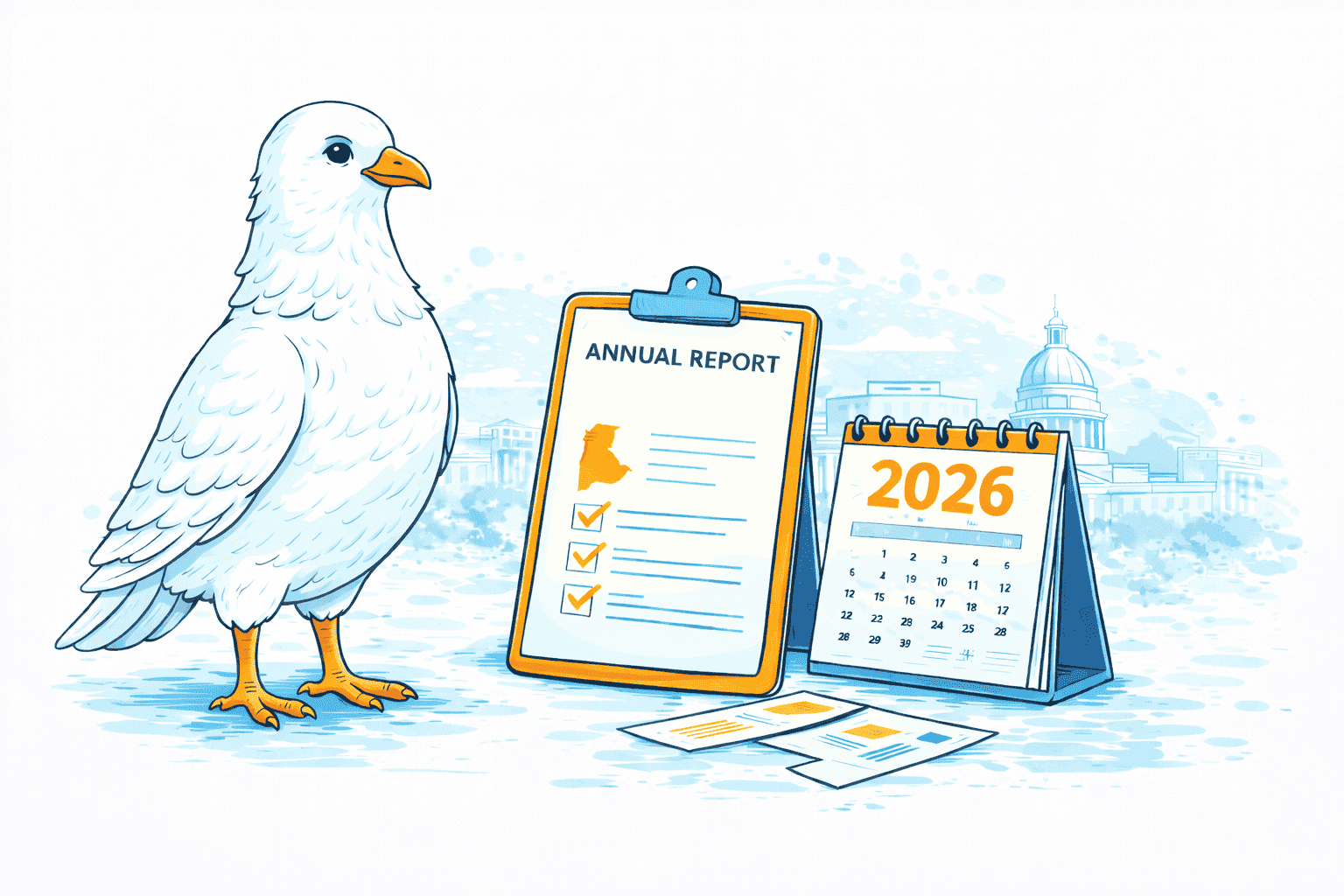Foreign Qualification in New York: Registering a Foreign Entity
.avif)
Key takeaways
- If your business is active in New York but formed elsewhere, you may need foreign qualification to operate legally.
- New York doesn’t clearly define “doing business,” but ongoing, local, revenue-generating activity usually qualifies.
- You’ll need to file an Application for Authority and include a Certificate of Good Standing from your home state.
- LLCs have an extra publication requirement that must be completed within 120 days of approval.
- Skipping registration can lead to penalties, tax issues, and lost legal rights—so it’s not something to overlook.
Expanding your business into New York means there are legal formalities you can’t ignore. If your company was formed in another state, you might need what’s called foreign qualification in New York to operate there. The process isn’t overly complex, but there are clear rules about who needs to register and what’s considered “doing business.” Let’s start with how New York defines a foreign entity.
Businesses New York defines as a foreign entity
Any business formed outside of New York is considered a foreign entity if it does business in the state. That includes corporations, LLCs, and other legal structures—even if you're fully remote or just signing a lease in New York.
How to assess if your business qualifies as foreign
New York doesn’t offer a clear-cut definition of what counts as “doing business” in the state. Instead, the law focuses on how essential, consistent, and locally rooted your activity is. Below are the main criteria to consider.
Your activity has a local, intrastate character
If your business operates within New York—not just engaging across state lines—it may qualify as “doing business.” Local offices, employees, or in-state operations that aren’t purely remote-facing can trigger registration requirements for a foreign LLC doing business in New York, especially if they serve New York-based clients or functions.
Your activity is regular, permanent, and systematic
One-off transactions or occasional visits to New York won’t usually trigger registration. But if your operations are ongoing, predictable, or tied to a physical presence, that’s a different story. Courts look for patterns. Repeated sales activity, long-term leases, or local staff often signal that your business has planted roots in the state.
Your activity is central to your core operations
Is the work you’re doing in New York essential to how your business runs and not just administrative or secondary? If so, it may be deemed as “doing business”. Think manufacturing, client servicing, or anything tied directly to revenue. Incidental activity usually doesn’t require registration, but if New York operations keep the business going, you may well be in foreign entity territory.
When in doubt, talk to a legal or compliance expert
New York’s criteria aren’t black and white—and edge cases are common. If you’re unsure whether your business crosses the line, it’s worth getting a second opinion. A qualified attorney or compliance advisor can help you interpret your risk and navigate foreign entity registration in NY to avoid fines down the line.
Reasons you may not have to register
Not every business activity in New York triggers registration. The law carves out several exceptions, although they’re narrow and usually apply to businesses doing only limited or isolated tasks in the state.
You're only maintaining or defending a legal action
Filing or defending a lawsuit in New York doesn’t count as “doing business.” Courts recognize that legal proceedings are often one-off or reactive, not a sign of regular commercial activity. So if your only tie to the state is a legal dispute, you likely don’t need to register. That said, it’s still worth checking your broader exposure.
You hold board or shareholder meetings in New York
Simply gathering directors or shareholders in New York doesn’t mean your business is operating there. Occasional meetings—even with strategic discussions—aren’t viewed as core commercial activity. It’s a recognized exception under state law. Just be sure to document the purpose of those meetings clearly, especially if other New York-based activity is happening in parallel.
You maintain a bank account in the state
Having a New York-based bank account doesn’t automatically mean you’re doing business there. Plenty of companies use local accounts for convenience or investor requirements without triggering registration. It’s generally seen as a passive activity—but if it’s tied to broader, active operations in the state, it’s worth a closer look.
You manage securities or appoint trustees
If your only activity in New York involves handling securities like transferring shares or appointing trustees, it generally doesn’t count as “doing business.” These actions are considered administrative and aren’t tied to core commercial operations. However, if other in-state activities are layered on top, you may need to apply for foreign qualification.
Your New York activity is isolated or incidental
Is your company’s connection to New York limited to the occasional transaction, event, or one-off engagement? In such cases, registration likely isn’t required. The key test is regularity. Isolated or incidental activity, especially if it’s not tied to your core operations, isn’t usually enough to qualify as “doing business” under state law. Just don’t mistake repeat convenience for exception.
How to register a foreign corporation in New York
New York foreign corporation registration isn’t complicated, but it does involve a few very specific steps. Here’s what you’ll need to do.
1. Confirm your business name is available in New York
Before anything else, check that your corporate name isn’t already in use in New York. You can search the Department of State’s online database. If there’s a conflict, you’ll need to tweak the name slightly or register under an assumed name. Don’t skip this step; it’s a quick way to avoid delays later.
2. Appoint a New York registered agent
You’ll need a registered agent with a physical address in New York—no P.O. boxes allowed. This person or service handles official documents on your behalf, including legal notices. It’s a legal requirement, not a formality, and ensures your business stays responsive to state communications. Choose someone reliable, because missed paperwork can come with serious consequences.
3. Get a Certificate of Good Standing from your home state
New York wants proof that your business is active and in good standing where it was originally formed. You’ll need to request a Certificate of Good Standing (sometimes called a Certificate of Existence) from your home state. Make sure it’s dated within the last year, otherwise New York won’t accept it with your application.
4. Complete and file the Application for Authority
This is the formal document that gets your business registered in New York. You’ll need to submit it to the Department of State along with your filing fee. The form asks for basic corporate details like your home jurisdiction, registered agent, and New York address. Choose standard or expedited processing, depending on how fast you need approval.
5. Wait for your Certificate of Authority to arrive
Once your application is approved, the state will send you a Certificate of Authority. This document is your green light to legally do business in New York. Keep it on file. You may need to show it to banks, landlords, or other agencies down the line.
Specifics for registering an LLC in New York
Most steps for foreign qualification apply across entity types, but LLCs have one key extra requirement to keep in mind. Here’s what makes the New York foreign LLC registration process slightly different:
- File a Certificate of Publication: Within 120 days of approval, publish your Application for Authority in two local newspapers (assigned by the county clerk). File the Affidavit of Publication and Certificate of Publication (Form DOS-1707) with the state.
Failing to meet this step can jeopardize your good standing, so don’t let it slip through the cracks.
Penalties for not registering your business
Operating in New York without foreign qualification can come back to bite you. It’s not just a paperwork issue; there are real legal and financial consequences for skipping registration.
- Losing the right to sue: Unregistered entities lose access to the courts. You may be barred from enforcing contracts until you're properly authorized.
- Facing long registration delays: If you’ve already been doing business in the state, you may need extra approvals, some of which can take months.
- Paying back taxes and penalties: You’ll likely owe fees dating back to when you started doing business, plus penalties and interest.
- Jeopardizing financing and contracts: Lenders, partners, and agencies often require proof of good standing before moving forward.
Securing a New York address for your business
If you're registering in New York, you'll need a physical address for official correspondence, even if you're fully remote. Postal offers a flat-rate virtual address service on 5th Avenue, which is ideal for businesses that want a premium presence without the overhead.
Postal provides the best virtual address for business by combining location, reliability, and simplicity. Your mail is scanned, deadlines are flagged, and important documents are routed straight to the right teammate via Slack, Teams, or email—so nothing gets missed.
If you’re expanding on the west coast, check out our guide for foreign qualification in California to learn more about the process there.
Frequently asked questions about foreign qualification in New York
Have questions about NY foreign qualification? Below are quick answers to some of the most common scenarios businesses run into during the process.
What constitutes doing business in New York?
If your activity in New York is regular, local, and essential to operations, you’re likely “doing business” in the state’s eyes.
How to foreign qualify LLC in New York?
To complete your New York foreign LLC registration, file an Application for Authority, submit a good standing certificate, and follow the publication requirement within 120 days.
What is the difference between domestication and foreign qualification in New York?
Foreign qualification lets an out-of-state business operate in New York. Domestication, which New York doesn’t allow, involves changing a business’s home state entirely.
Does a foreign LLC pay taxes in both New York and its home state?
Yes, a foreign LLC may owe taxes in both states if it's generating income in each. Tax obligations depend on your business structure and where revenue is earned. It’s best to check with an accountant or tax advisor familiar with New York and your home state.
How do I register as a foreign entity in New York State?
To complete your New York foreign entity registration, you’ll need a registered agent, a Certificate of Good Standing, and a filed Application for Authority with the state.
What is an application of authority in New York?
An Application for Authority is the form a foreign business files with New York to legally operate in the state. It’s your official registration paperwork.
Who needs a Certificate of Authority in New York?
Any out-of-state business regularly operating in New York—whether through employees, leases, or services—generally needs a Certificate of Authority to stay compliant and avoid penalties.
How much is the Certificate of Authority in NY?
The Certificate of Authority filing fee depends on your entity type. It costs $225 for a foreign corporation and $250 for a foreign LLC. You can also pay for expedited processing for an additional fee.
Can a foreign LLC own property in New York?
Yes, a foreign LLC can own property in New York. Holding real estate alone doesn’t automatically trigger foreign qualification, unless property management becomes a central, ongoing part of your operations.
Manage your mail from anywhere
Never lose a letter or change your business address again.




